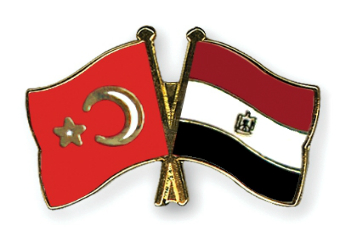Turkey may struggle to narrow its current-account deficit as mounting tensions with Egypt make it harder for traders to reach the Middle East, the destination for about a fifth of Turkish exports.
Turkish exports shipped via Egypt’s Damietta port to customers in the country and throughout the Persian Gulf dropped as much as 30 percent after the army toppled Islamist President Mohamed Morsi on July 3, triggering violence, according to data of Mersin, Turkey-based OSF International Logistics Services. Exports to 10 Middle Eastern trade partners shrank 5 percent in June, state statistics office data show.
“Nobody seems to realize there is a very serious problem here,” Mustafa Yilmaz, owner of Cem-Ay transportation, based in Antakya, Turkey, said by phone yesterday. “We are losing trade just because of political developments with those countries.”
Turkey’s reliance on the Middle East has increased as the ratio of exports to countries includingIraq, Saudi Arabia, Kuwait and Egypt more than tripled in the past decade, according to data from the Ankara-based statistics office. The country has been struggling to reduce its current-account gap as it faces the highest borrowing costs in 19 months and the worst-performing currency after South Africa’s rand among emerging markets in Europe, the Middle East and Africa this year.
Turkey has sent goods to the Persian Gulf via Egypt since trade through Syria, caught in the throes of a civil war, was shut in late 2011. Turkish Prime Minister Recep Tayyip Erdogan has opposed the Egyptian army’s violent crackdown of pro-Morsi protests since Aug. 14.
Slowing Growth
“Exports through Egypt can only continue if tensions there do not increase,” Ali Serdar Kocaoglu, general manager of OSF, said by phone Aug. 22.
Turkish shipments to 10 major markets in the Mideast increased almost 15-fold to $29.5 billion during the decade to 2012, making up 19 percent of the nation’s total sales abroad, according to government data. Exports rose 7.6 percent in the first half from a year earlier, down from 61 percent growth in 2012 even after the civil war in Syria closed that trade route.
Iraq, which shares a 330-kilometer (205-mile) border with Turkey, accounted for $10.8 billion of sales in 2012. The bulk of the remaining shipments to the nine Middle East markets go through Egypt, with volume falling 30 percent since the beginning of last month, Kocaoglu said.
Issues involving Egypt will probably be resolved within a month, Zuhal Mansfield, head of the Turkey-Egypt Business Council in Istanbul, said by phone Aug. 23. “At the moment there is not a big problem with Egypt with regard to transportation of Turkish goods to it or through it.”
Record Low
The lira weakened 0.2 percent to 1.9912 per dollar at 6:10 p.m. in Istanbul yesterday, after earlier falling to a record 1.9995. The currency has lost 10 percent this year. The yield on two-year government bonds jumped 42 basis points, or 0.42 percentage point, to 10.16 percent yesterday, the highest since January 2012.
The slowdown in exports may exacerbate a current-account deficit that widened to $35.9 billion at the end of the first six months in 2013, compared with $30 billion a year earlier. Turkey may “slightly” miss its forecast for a shortfall of $60.7 billion this year, Economy Minister Zafer Caglayan said Aug. 15.
Credit-default swaps on Turkey, contracts insuring the country’s debt against non-payment, have climbed 49 basis points since the military ousted Morsi last month, according to data compiled by Bloomberg as of last week’s close. That’s the second-biggest increase among developing markets in Europe, the Middle East and Africa.
“Turkey has increased its exports to the Middle East region due to strong demand,” Nihan Ziya-Erdem, an Istanbul-based economist at Turkiye Garanti Bankasi AS (GARAN), Turkey’s largest bank by market value, said by phone yesterday. “But this contribution will go down along with increasing tensions there.”
Source: Bloomberg



